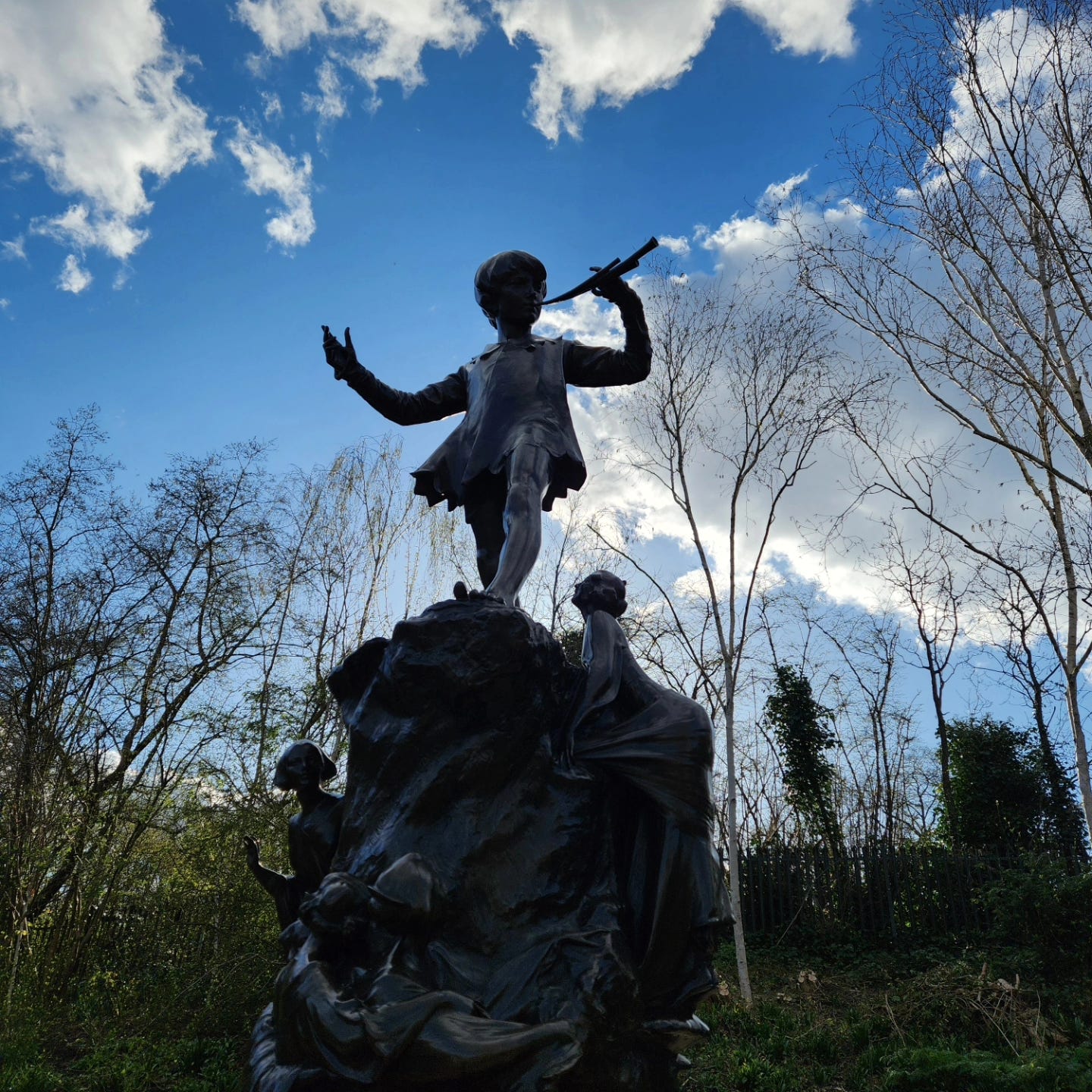I was in London last week, and couldn’t resist the opportunity to visit the Peter Pan statue in Kensington Gardens and the Sherlock Holmes Museum at 221B Baker Street. And since then I’ve been wondering why I am so drawn to these two character, Sherlock and Peter. Why are so many people drawn to them?
To me, they are both about the outsider within ourselves.
Sherlock is an outsider. Being of such great intelligence, he has trouble relating to other people. In fact, it seems as if Watson is the only person who can not only tolerate him for long periods of time, but genuinely likes him.
Peter Pan is an outsider too, literally tapping on Wendy's window to be let in. He is originally from our world, but resides in Neverland, a place made of our childhood subconscious, where you forget who you are and have no sense of time.
They both have comparatively pedestrian counterparts too. Sherlock has his roommate and companion Watson and Peter has Wendy. In a way, Wendy is Peter's Watson. She is fascinated by him. While he, like Sherlock, seems (from the outside, at least) to only take interest in Wendy as far as she can play a part in his games.
For both Peter Pan and Sherlock Holmes, the game is always afoot, a puzzle to be solved, an adventure to be had for its own sake. And to them, the real people in their lives are treated more like pieces in the game than genuine human beings. But without Wendy and Watson, these stories do not exist. They are the human element in their superhuman partners’ lives. They are us, playing with gods, wrestling with the experience of life through our relationships with others, and with ourselves. Whereas Sherlock and Peter are set tragically apart from real life, embodying both our wants and our fears, our dreams and our nightmares. And we are drawn to them and repelled by them equally. Like Watson, we wish we could be as smart as Sherlock, with his near-superhuman abilities of deduction, but are disturbed by the boredom and isolation he feels as a result. Like Wendy, we wish we could be as free as Peter, that we could stay a child forever, but are disturbed by his selective indifference and cruelty towards others, as well as his short memory. Watson and Wendy are the conduits for these conflicted feelings.
Both authors, Arthur Conan Doyle and J.M. Barrie were keenly aware of the role of the narrator in their stories. While Watson is Sherlock's sidekick, he is also the narrator and self-proclaimed biographer of Sherlock's adventures, who publishes them in the hopes that Sherlock will get the credit he deserves (yet often turns down). In one story, Holmes even comments on Watson's version of events, stating:
I glanced over it. Honestly, I cannot congratulate you upon it. Detection is, or ought to be, an exact science and should be treated in the same cold and unemotional manner. You have attempted to tinge it with romanticism... The only point in the case which deserved mention was the curious analytical reasoning from effects to causes, by which I succeeded in unravelling it.
Doyle is winking at his readers here, knowing that without Watson, the adventures of Sherlock Holmes would be incredibly dull, like listening to someone explain a game of chess without knowing the players. But he is also giving us insight into Holmes’ fault as a character. His criticisms of Watson (of which there are many throughout their times together), say more about Holmes than of Watson. Like Peter Pan's disdain for anything he percieves as “grown up,” Holmes’ inability to appreciate people who aren't his intellectual equal is what separates him from society (for better or for worse).
In Peter Pan, an argument can be made that Peter is a mere aspect of Wendy. There is a reason why J.M. Barrie insisted that the theatrical role of Peter be played by a woman: because Peter is a manifestation of Wendy's subconscious struggle at the threshold of adulthood (or, at least, pre-teen-hood, in which she is expected to start thinking about “grown up” things); Peter is a sort of psychopomp determining whether or not Wendy is ready or willing to leave childhood behind. And, like in Sherlock’s adventures, the narrator of Peter Pan is a character, albeit an intentionally illusive one, often talking directly to the reader, implying that he has a direct relationship with the children in the story, and occasionally dropping hints as to the pre-Neverland backstories of both Peter and Captain Hook. Some claim that Barrie admits that he himself is the narrator in question, but I contend that it is more like a characterized version of himself. And this characterization of the narrator, both in Watson and in Barrie, places the reader by their side, grounding them to a reality in which the supernatural (or near-supernatural) exists.
This got me thinking about other stories that share this psychic material, explore the idols we see and experience through the eyes of another, that look at the outsider within ourselves, the aspects of our being that we admire and yet fear. What are some of your favorites? Let me know in the comments.
Keep reading with a 7-day free trial
Subscribe to Nick Gibney’s Story Board to keep reading this post and get 7 days of free access to the full post archives.






